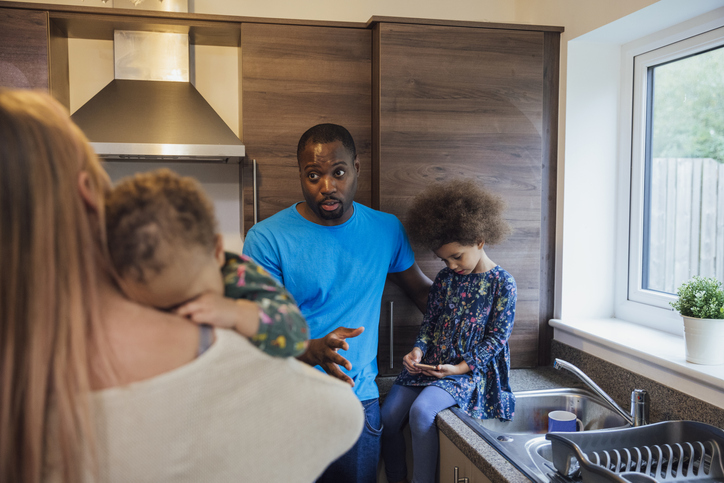What Happens When We Hear People Out More
Why It’s Hard For Us To Hear People Out And What Happens When We Do It More
Share the post
Share this link via
Or copy link

Source: Westend61 / Getty
When you get into a conflict with somebody, whether it be a romantic partner, a family member, or a friend, what is your ultimate goal in the conversation? Is it to solve the problem? Is it to make the smartest points possible? Is it to get your voice heard? Or is it to listen? Many individuals would probably like to say that they’re looking for a solution and that they’re listening. But if they were honest with themselves and reflected on past conflicts, they’d realize they’d really just talked the most and the loudest and didn’t do a whole lot of listening.
Most people have a lot more pride than they’d like to admit, and compromise a lot less than they’d care to say. It can be hard to really wrap our heads around the fact that compromise means giving something up, and that hearing someone out means letting go of some of our preconceived notions – those are pretty difficult to release. But, when we do begin to hear people out, life can really feel like it opens up. Conflicts that felt impossible to solve and caused a lot of stress can finally dissolve or at least become smaller. Maybe we don’t get to be “right” or to “win,” but we do get to be happier. We spoke with licensed therapist and best-selling author Latasha Matthews about why we struggle to hear others out, and how life changes when we do.

Source: Noah Heinrich / Noah Heinrich
What major issues do we get “stuck” in?
“There are a variety of conflicts that impact family dynamics,” Matthews explains. “Families often struggle with conflicts surrounding money, childrearing, in-law related conflict, and divorcee family conflict over child-rearing concerns, just to name a few. As for romantic relationships, she says, “Finances, sex, and child-rearing are common conflicts that worsen when the couple does not hear each other out.”

Source: DjelicS / Getty
When do couples refuse to listen?
Love MadameNoire? Get more! Join the MadameNoire Newsletter
We care about your data. See our privacy policy.
We asked Matthews which issues in particular she sees, as a therapist, bring listening to a screeching halt. She says, “As a family and couples’ therapist I have worked with thousands of individuals throughout my career on effective tools to rebuild relationships. I have found that deceit and infidelity are by far the two biggest areas that cause parties to shut down and refuse to listen to their loved ones.”

Source: PixelsEffect / Getty
What about parents and their adult children?
“One of the big problems with Adult children and their parents, is they tend to have problems with setting healthy boundaries with each other,” explains Matthews. “At times it is difficult for each party to realize that the roles and structure of the relationship have changed. Boundary related concerns also show up in stepparent and in-law relationships as well because the expectations and the respect has not been clearly defined.”

Source: PeopleImages / Getty
When the kids become the caretakers
“Another big family dynamic that causes lots of conflict is the adult children caring for elderly parents. Siblings would benefit from remembering that it’s important to focus on the common goal, which is their parents, and begin establishing roles and responsibilities for themselves prior to their parent’s health declining,” says Matthews. We covered things to discuss with aging parents here.

Source: 2A Images / Getty
How do we fail in listening?
“It is especially important to listen to understand instead of listening to respond,” states Matthews. “Listening is the key component in healthy relationships and most individuals have a difficult time focusing on what the other person is saying when they are raging with anger and trying to get their own needs met.”

Source: SDI Productions / Getty
Why won’t we listen?
We asked Matthews what underlying fear makes people so resistant to listening to others in a conflict. “Most often in relationships people are trying to be heard and attempting to get their needs met and fear that if they listen that neither of these things will happen,” says Matthews. “People also have a difficult time taking accountability and taking steps to change behaviors.”

Source: SolStock / Getty
We inherited our fighting styles
If you find conflict really difficult to deal with, Matthews says that may not be entirely your fault – it’s something that might have been passed down to you. But that doesn’t mean it isn’t on you to correct it. “People are not equipped to fight in a healthy way. Oftentimes individuals were not taught to listen in their family of origin, therefore they are simply acting out the unhealthy listening skills learned as a child.”

Source: Viktorcvetkovic / Getty
What if we can’t fix things?
Matthews explained that just because you don’t believe you can come to a solution doesn’t mean you don’t get something out of hearing the other person out. “Listening shows that you are invested in the relationship and that what the other person has to say matters. It also helps clarify miscommunication and allows a safe place to process concerns. Listening can disarm any argument and it provides a common ground to establish solutions to heavy problems.”

Source: SDI Productions / Getty
How to calm down and tune in
Matthews provided useful tips for those moments when your urge is to blow up and walk away, but the more useful thing would be to remain calm and listen.
- Face the speaker and maintain good eye contact
- Keep an open and curious mind
- Be relaxed and attentive
- Listen to the words and visualize what the speaker is saying
- Tap into the feelings of the speaker
- Do not interrupt or defend the statements
- Nod and show affirming body language
- Summarize what the speaker is saying to show that you are tuned in
- Ask clarifying questions
- Pay attention to no-verbal cues and voice changes

Source: 10’000 Hours / Getty
How do we encourage others to speak up?
Sometimes, the issue isn’t that we won’t listen, but rather that the other party doesn’t feel safe speaking up. So we asked Matthews what some neutral, non-judgmental phrases and questions are to get someone to open up. “Using open-ended questions is helpful when there is conflict in communication. Here are a few questions you can ask:
- Ask the person “How can I support you?”
- “Please help me understand what you are saying?”
- Repeat what the person is saying and ask them if you are understanding them correctly
- Ask the person if they have completed their statement before responding
- “I apologize for not listening; can you give me another opportunity to listen?”
-

Style, Swagger, And Star Power: Rihanna, Ciara, Olandria, Angel Reese And More Shine At The 2025 CFDA Fashion Awards
-

'The Street I Grew Up On Is Now Named After Me' — Trailblazer Dominique Morgan On Pride, Power And Blackness
-

How Fit Women Eat In Group Settings
-

Mompreneurs: iOne SVP Allison McGevna Talks Breaking Revenue Records And Scheduling Time For Creativity



